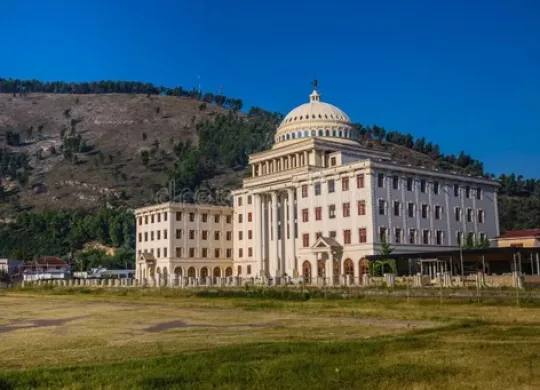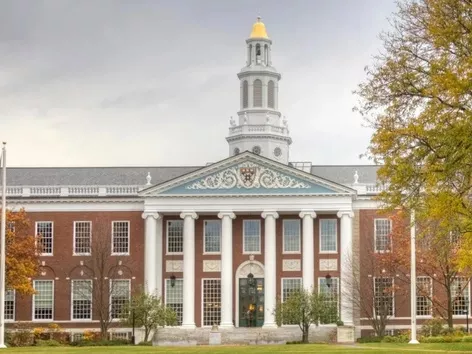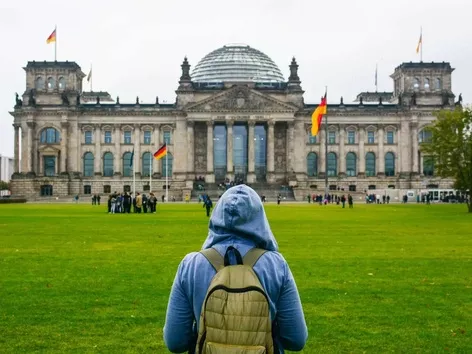Studying in Albania: best universities, scholarships, study programs and student visa procedure
Table of contents
- Education system in Albania
- Advantages of studying in Albania
- Top Universities in Albania
- Can foreigners study in Albania?
- Procedure for applying for a student visa in Albania
- Application package for university admission in Albania
- Scholarships in Albania in 2025
- Popular fields of study in Albania
- Can foreigners work in Albania after graduation?
- Average cost of living in major cities in Albania
- Can international students bring their family members with them?

Albania is becoming a promising destination for international students seeking a European education at a reasonable price. Find out how the education system in Albania works, what are the advantages of studying in the country, which universities are best for foreigners, how to apply for a student visa and much more useful information
Albania is quickly becoming an attractive destination for international students looking to pursue a European education. The country attracts international students with its reasonable tuition fees, diverse academic offerings, friendly atmosphere and even the prospect of admission without taking the IELTS.
This article brings together key information about studying in Albania in 2025: from universities and scholarships to tuition costs and visa requirements.
Choose a reliable health insurance policy on the Visit World portal to protect yourself from unforeseen expenses during your move. Support from a trusted insurance agent with a guaranteed payout in just a couple of clicks!
Education system in Albania
The entire education system in Albania is divided into public and private.
Secondary education is free and compulsory. The first stage is from grades 1 to 4. The second stage is from grades 5 to 9. The third stage is from grades 10 to 12. Instead of completing 12th grade, students after grade 9 can go to study at special technical schools and schools for vocational education.
After completing secondary education, a person has the right to enter a higher education institution. To do this, you need to pass entrance exams and pay tuition fees. This requirement also applies to foreigners.
Advantages of studying in Albania
Albania is not only a picturesque landscape and a rich cultural heritage, but also an ideal place to get a quality education at an affordable price.
- No IELTS
Many universities in Albania accept alternative methods of confirming English proficiency, which makes the admission process easier.
- Affordable tuition fees
Tuition fees range from 1,500 to 4,000 euros per year, which is significantly lower than in most European countries. This allows you to get a European education without large financial costs.
- Safe environment and unique culture
Albania is a country with incredible natural beauty, a safe environment for students and an unrivaled combination of Mediterranean and Balkan cultures.
- Growing international community
The number of international students is increasing every year, reaching over 5,000 in 2023. This allows students to immerse themselves in a diverse, multicultural atmosphere.
Top Universities in Albania
- University of Tirana: The largest and most prestigious university in the country, renowned for its strong academic programs and numerous research opportunities.
- Polytechnic University of Tirana: Known for its engineering and technical programs, this university is an ideal choice for students seeking to study technology and innovation.
- Epoch University: A private university that provides high-quality education in the fields of business, architecture, and engineering.
- European University of Tirana: Focused on social sciences, economics, and law, this university offers a modern academic environment and an international student community.
- University of Agriculture of Tirana: specializes in agricultural sciences and is a leading educational institution in research and education in the field of agriculture and ecology.
Can foreigners study in Albania?
Foreign citizens can study in Albania, but only if they have the necessary documents. Representatives of Morocco, Afghanistan, Tunisia and most other countries of the world need to obtain a student visa to study in Albania.
Procedure for applying for a student visa in Albania
In order to study in Albania, international students need to apply for a student visa. Here are the main steps in this process:
- Step 1 – Letter of Admission
Obtain an official acceptance letter from an accredited Albanian university.
- Step 2 – Fill out the visa application form
Complete the student visa application form, which can be found on the Albanian Immigration Service website or at the nearest Albanian embassy or consulate.
- Step 3 – Prepare the package of documents
Prepare the required documents, including a valid passport, recent photographs, proof of financial capacity, health insurance, and academic certificates.
- Step 4 – Pay the visa fee
Pay the visa application fee.
- Step 5 – Attend the interview
If necessary, attend the interview at the Albanian embassy or consulate.
- Step 6 – Visa approval
Wait for the application to be processed and the visa to be approved.
Processing time for a student visa application in Albania: 4–6 weeks.
Visa fee: €60–€80.
Application package for university admission in Albania
- Application form: fill out the application online or through the university portal.
- Academic transcripts and certificates: translate into English or Albanian if necessary.
- Proof of English language proficiency: certificate from previous school, Duolingo or TOEFL scores (if available).
- Copy of passport: passport must be valid for at least 6 months.
- Motivational letter: write a letter of 500-800 words, stating your goals and reasons for choosing to study in Albania.
- Letters of recommendation: prepare two letters from professors or employers.
- Resume / CV: include academic and extracurricular achievements.
- Financial proof: bank statements proving that you have funds to live in Albania, in the amount of 3,000 to 5,000 euros.
These documents will help you successfully apply to study at Albanian universities.
Scholarships in Albania in 2025
Albania offers a wide range of scholarships for international students who wish to obtain a quality education at an affordable price. Here are the main financial support options:
- Albanian Government Scholarships
Covering from 50% to 100% of the tuition fee for students with high academic achievements. You can apply through the website of the Ministry of Education of Albania.
- Erasmus+ Scholarships
The program is available to students from EU and non-EU countries studying at partner universities (e.g. Epoka). Provides monthly financial support of €800-€1200.
- University Scholarships
1. Epoka Merit Scholarship: up to €2000 per year for students with the highest academic results.
2. University of Tirana Research Grants: available for master's and doctoral students.
- Bilateral Scholarships
Partner countries such as Turkey, Greece and Italy offer specific scholarships for students who choose to study in Albania.
Popular fields of study in Albania
Albanian universities offer a wide range of academic programs, but some majors are particularly popular among international students:
- Business and Economics
Programs in management, finance and economic analysis remain among the most popular.
- Engineering and Technology
Fields related to civil, electrical and computer engineering attract students seeking careers in an innovative environment.
- Medicine and Health
Medical and health-related programs are gaining popularity due to their high standards of training.
- Social Sciences and Humanities
These programs provide a deep understanding of society, culture and human behavior.
- Agricultural Sciences and Ecology
Strong academic courses with a focus on sustainable agriculture, environmental protection and modern agricultural technologies.
Can foreigners work in Albania after graduation?
After graduation, international students are eligible to apply for a work visa to gain professional experience.
The Albanian government allows graduates to remain in the country if they find a job that meets the requirements. This path to legal employment makes Albania particularly attractive to students who want to gain international experience and start a career abroad.
Average cost of living in major cities in Albania
Living in Albania is quite affordable compared to other European countries, making it attractive to students on a budget. Below are the approximate monthly living costs in the country’s largest cities:
- Tirana – €400–€600
- Durres – €350–€500
- Vlora – €300–€450
- Shkoder – €250–€400
- Elbasan – €250–€400
These amounts include housing, food, transportation, and daily necessities. With affordable prices, students can live comfortably within a reasonable budget.
Can international students bring their family members with them?
According to official information from the Albanian Immigration Service, international students are allowed to bring their dependents to the country – husband, wife, and children. Each family member must submit a separate visa application and meet the requirements, including proof of financial capacity and availability of suitable accommodation.
Studying in Albania offers international students the opportunity to gain a European education at an affordable price, immerse themselves in a new culture, and broaden their career horizons. With a wide range of study programs, a conducive living and learning environment, and employment opportunities after graduation, Albania is becoming increasingly attractive to those seeking a quality international experience.
Obtaining a study visa is a complex process that involves preparing a large number of documents. Order the "Study Guide" from the Visit World team to find out what documents you need to prepare for a student visa to Albania, as well as get useful tips for enrolling in foreign universities.
Reminder! Albania is becoming an increasingly attractive destination for expats and remote workers due to its accessibility and favorable living and working conditions. We have already told you how to get a residence permit in Albania and what types of permits are available for expatriates, entrepreneurs and students in 2025, as well as what are the document requirements and the application process.
Products from Visit World for a comfortable trip:
Checklist for obtaining a visa and necessary documents in Albania;
Legal advice on immigration to Albania;
Travel insurance for foreigners in Albania;
Medical insurance all over the world.
We monitor the accuracy and relevance of our information. Therefore, if you see any error or discrepancy, please write to our hotline.
Frequantly
asked questions
Can a foreign student work in Albania?
Is Albania good for education?
Is Albania a cheap country to live in?
Recommended articles
2 min
Education
Education System in Andorra: educational structure, benefits and prospects
The education system in Andorra is an example of a multilingual and multicultural approach, combining tradition and modern international standards. Learn about the structure of education in Andorra, costs, recent reforms in the field and the benefits of studying in Andorra for international students
01 May. 2025
More details1 min
Education
Harvard University has announced new financial aid initiatives that will take effect in the 2025-26 academic year. Find out which students will be eligible for grants to study at Harvard, as well as where else in the United States these initiatives are being implemented.
20 Mar. 2025
More details2 min
Education
Study in Germany 2025: How a Foreign Student Can Enter German Universities
In 2025, Germany continues to be a popular destination for international students due to its high level of education, affordability and numerous career opportunities after graduation. Find out how to apply for a student visa, which universities are best for international students and much more useful information about education
08 Apr. 2025
More details2 min
Education
Studying in Europe for Foreigners in 2025-2026: A Guide for Expats
Studying in Europe is a great opportunity for students seeking a world-class education and immersion in a new culture. Learn how to choose a country and program to study in, visa requirements, available scholarships and funding opportunities, living costs, and job prospects after graduation in the EU
24 Apr. 2025
More detailsAll materials and articles are owned by VisitWorld.Today and are protected by international intellectual property regulations. When using materials, approval from VisitWorld.Today is required.
